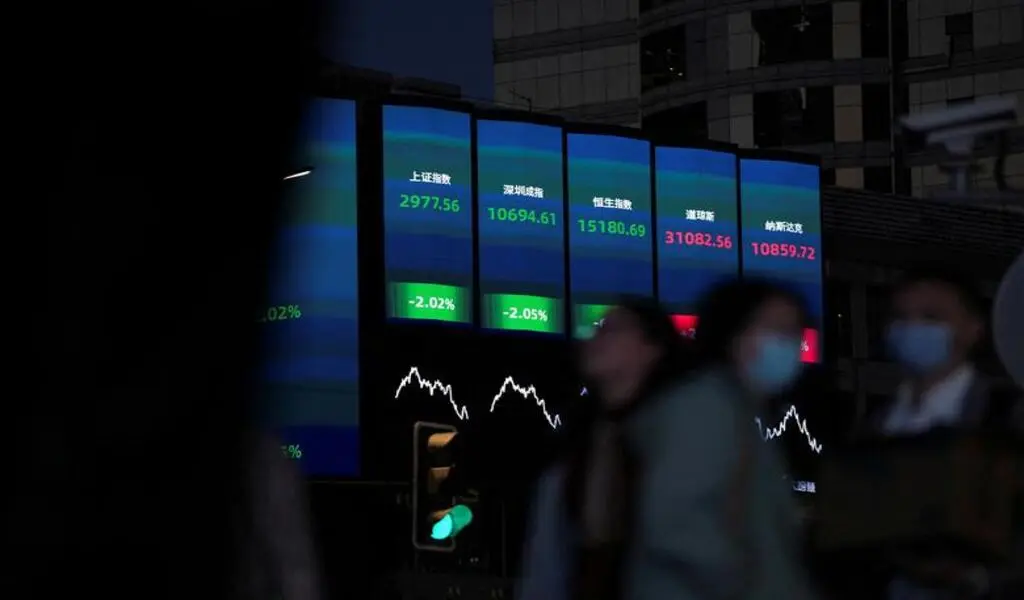(CTN News) – On Monday, oil prices fell, and U.S. stocks fell along with them as unusual demonstrations against China’s tight zero-COvid regulations in key Chinese cities added to worries about the future of the international economy.
U.S. Treasury rates fell over the weekend due to increased COVID cases and conflicts between police and demonstrators in numerous Chinese cities. Even safe-haven assets like the dollar and gold saw losses.
“Concerns have been raised about the rising number of Covid cases in China and how the government would respond.
We went from what we thought was a reopening to perhaps more limits, “John Hancock Investment Management’s co-chief investment strategist, Matthew Miskin, said.
“One of the biggest economies falling offline will impact global growth. All businesses will be impacted, either positively or negatively.”
The S&P 500 lost 30.51 points, or 0.76 percent, to 3,995.61, the Dow Jones Industrial Average dropped 192.36 points, or 0.56 percent, to 34,154.67, and the Nasdaq Composite plummeted 90.21 points, or 0.8 percent, to 11,136.14.

The global MSCI stock index fell 0.71 percent and the pan-European STOXX 600 index fell 0.50 percent. Stocks in emerging markets decreased by 0.94 percent.
While the Nikkei in Japan dropped 0.42 percent, the MSCI’s broadest index of Asia-Pacific equities outside of Japan ended 1.1 percent down.
Oil prices, which use the tightness of China’s shutdown as a gauge for demand, somewhat recovered after falling to their lowest point since late December 2021.
At 10:48 a.m. ET (1548 GMT), Brent crude was down $1.32, or 1.6 percent, to $82.31 a barrel after plunging more than 3 percent to $80.61 earlier in the session, its lowest level since January 4.
After reaching its lowest level since December 22 of last year at $73.60, U.S. West Texas Intermediate (WTI) oil fell 75 cents, or 1%, to $75.53. Both benchmarks have seen weekly drops for the previous three weeks after last week’s 10-month lows.
According to Phil Flynn, an analyst with Price Futures Group in Chicago, Oil was cutting losses as market participants anticipated an OPEC+ meeting this weekend.
Flynn added that some of the selling that followed stories of upheavals in China was excessive. “Inventories are still close to record lows, which presumably raises the likelihood that OPEC will reduce output.”
On December 4, the Organization of the Petroleum Exporting Countries (OPEC) and its allies, which includes Russia, will meet. In October, OPEC+ cut its daily production goal by 2 million barrels.
The safe-haven Japanese yen and the Swiss franc increased in value while the Australian dollar and Chinese yuan declined. Meanwhile, the U.S. dollar declined, which experts deemed unexpected considering its customary safe-haven function.
Shaun Osborne, the chief FX strategist at Scotiabank in Toronto, said: “It does signal that the swing against the dollar in terms of the wider market attitude or market positioning is perhaps going a little bit deeper this morning, and that could well be important.”
Some market observers attributed the dollar’s movement to the decline in U.S. government rates, which made the dollar less appealing when compared to the yen.
The euro increased by 0.13 percent to $1.0409, while the dollar index decreased by 0.292 percent. Sterling last traded at $1.2044, down 0.41 percent on the day, while the Japanese yen gained 0.28 percent to 138.71 per dollar.
After dropping as high as 0.77 percent earlier, the dollar’s value versus the Swiss franc was down by 0.4 percent. Benchmark 10-year note rates in Treasuries dropped from 3.702 percent late on Friday to 3.674 percent, a decrease of 2.8 basis points.
The 2-year note was down 3.9 basis points to yield 4.4402 percent, while the 30-year bond was down 2.7 basis points to yield 3.725 percent from 3.752 percent.
Copper and other metals fell as a result of concerns over the economic expansion of China in other commodity markets.
Concerns over China’s Covid policies eclipsed any assistance provided by the 25 basis point reduction in the reserve requirement ratio (RRR) announced on Friday by the Chinese central bank, which would release nearly $70 billion to boost a struggling economy.
China reported 40,052 infections on Monday’s fifth day in a row of record-breaking local Covid cases. In Shanghai, protestors and police battled Sunday night as demonstrations escalated for the third day.
As Covid limits were implemented, there were demonstrations in Wuhan, Chengdu, and areas of the capital, Beijing.
After reaching a one-week high of $1763.70 per ounce, gold prices lost their gains. Gold’s spot price fell 0.5 percent to $1,748.07 per ounce.
Related CTN News:
COVID Protests have Broken Out in Shanghai as Anger Spreads Across China







